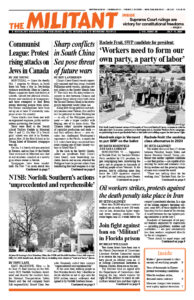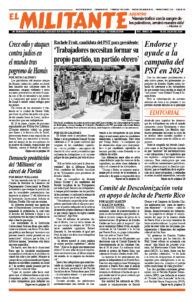MONTREAL — Some 9,300 train conductors, yard workers and dispatchers at Canadian National and Canadian Pacific Kansas City, the two largest rail companies in Canada, cast a second overwhelming strike vote June 29, with a 98.6% yes in an 89.5% turnout. The workers are members of the Teamsters Canada Rail Conference union.
Under Canadian labor law, the first strike mandate voted in on May 1 only covered 60 days. Liberal Minister of Labor Seamus O’Regan claimed that a strike limiting the movement of “essential goods,” mainly propane, but also food and other products, had to be prevented. He suspended workers’ right to strike as well as any lockout by the bosses until the Canadian Industrial Relations Board rules.
The second strike mandate means the union can give a 72-hour strike notice the moment the Industrial Relations Board rules on what “essential” shipments are. There is no time limit for the board’s ruling.
Both the union and rail bosses attacked the government’s moves to prevent a work stoppage. Canadian National and Canadian Pacific Kansas City bosses have implemented lockouts against workers in the past. The Teamsters Canada Rail Conference said the only ones pushing for restrictions were “industry associations with financial interests in averting a strike.”
CN and CPKC bosses have walked away from the negotiating table, demanding the federal government impose binding arbitration, which the union opposes.
“Both companies have demanded major concessions,” the Teamsters said June 7, “on articles pertaining to crew scheduling, hours of work, and fatigue management. Their demands undermine rail safety in Canada and remain a major stumbling block.”
Machinists Local 11 in British Columbia sent a solidarity message to the rail workers. “The concessions demanded by management … are unacceptable. Your fight is in the interest of all workers and deserves the support of the entire labour movement,” the union said.
“Your 98% strike vote is a strong enough message to the Canadian government that has taken the side of the companies in this conflict by opposing your right to strike in referring this conflict to the Industrial Relations Board. An injury to one is an injury to all.”

